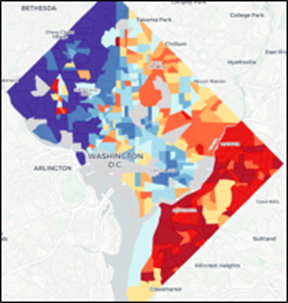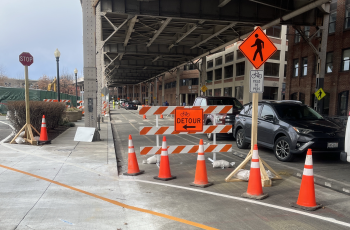 DC Water understands that lead exposure can cause serious health problems. Infants, children, pregnant women, and other adults can have increased adverse long term health effects. For this reason, we know it is our responsibility to act and address potential health related issues associated with lead service lines (lead pipes). Our mission is to provide safe drinking water to everyone.
DC Water understands that lead exposure can cause serious health problems. Infants, children, pregnant women, and other adults can have increased adverse long term health effects. For this reason, we know it is our responsibility to act and address potential health related issues associated with lead service lines (lead pipes). Our mission is to provide safe drinking water to everyone.
 DC Water recognizes lead pipes are a risk.
DC Water recognizes lead pipes are a risk.- DC Water has developed a data-driven methodology to prioritize the replacements.
- DC Water created the Lead Free DC plan to accelerate replacements and is investing millions of dollars for this initiative.
Health Effects of Exposures to Lead in Drinking Water
Lead can cause serious health problems if too much enters your body from drinking water or other sources. It can cause damage to the brain and kidneys and can interfere with the production of red blood cells that carry oxygen to all parts of your body. The greatest risk of lead exposure is to infants, young children, and pregnant women. Scientists have linked the effects of lead on the brain with lowered IQ in children. Adults with kidney problems and high blood pressure can be affected by low levels of lead more than healthy adults. Lead is stored in the bones and can be released later in life. During pregnancy, the child receives lead from the mother’s bones which may affect brain development and growth. Click here to learn more about the health effects of lead.
Data-Driven Approach
Although the use of lead pipes and fittings was phased out by the 1980’s, the burden of replacing lead pipes on private property has fallen on homeowners. The cost to replace these has been a barrier for many of our customers. To address this issue, DC Water’s team developed a Prioritization Model that uses a data-driven approach to identify high priority lead service replacements by block throughout the city where the likelihood of lead risk scores are in the highest 30% as determined by the model.


The prioritization model determines replacement areas based on several factors including:
- The Consequence of Lead: which identifies vulnerable populations and communities with the highest exposure for potential health impacts of lead service lines. (e.g., children and expectant families, median income below the federal poverty level).
- The Likelihood of Lead: which identifies locations where there is an increased probability of exposure to lead, utilizes data on water main breaks, water quality sampling and the existence of lead to determine the likelihood of lead exposure
- The number of critical facilities (e.g., childcare facilities, schools) identified as likely to have lead service lines.
- The potential to coordinate replacement work with other efforts to minimize or avoid multiple disruptions to the same community.
Lead Free DC Plan
Lead Free DC is our plan to replace all lead service lines in the District of Columbia. The plan combines DC Water’s existing programs utilized to replace lead service lines (LSL) in the District into one coordinated effort that prioritizes lead replacements for vulnerable populations most impacted by lead exposure (e.g. children and pregnant women).
Over the past few years, DC Water has taken significant steps to reduce lead in drinking water. These actions include monitoring for lead at the tap, controlling corrosion, replacing lead service pipes, educating customers on the health impacts of lead, and helping them identify and remove lead sources on their property. You can see our progress on our Lead Free DC Program Dashboard.



